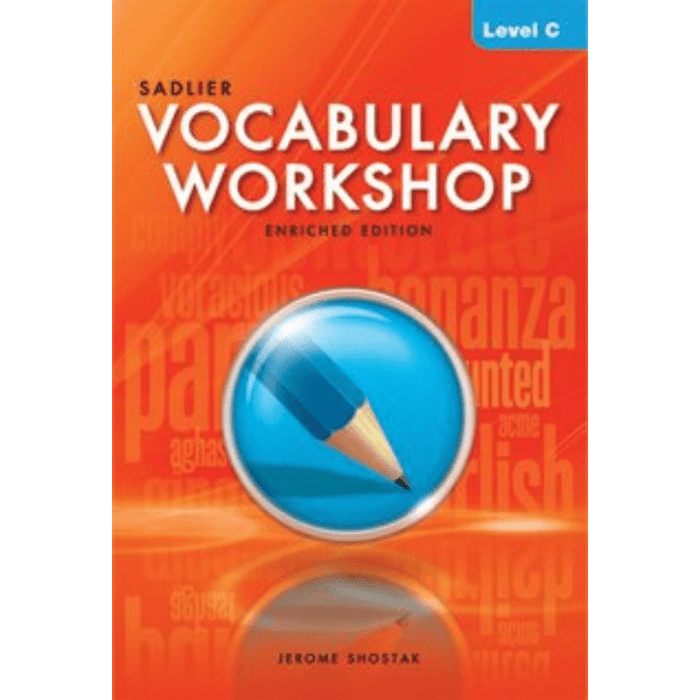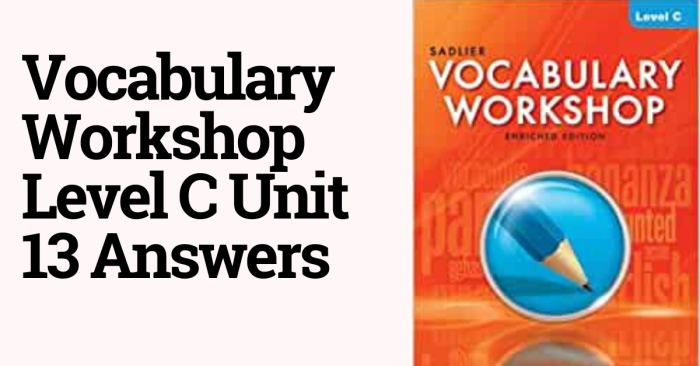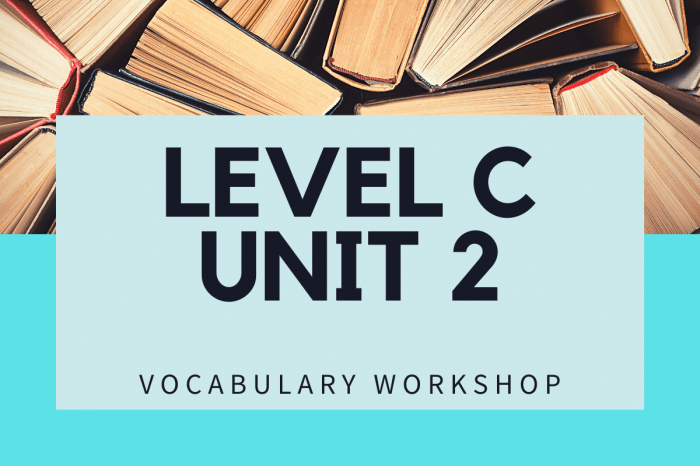Embarking on Vocabulary Workshop Level C Unit 13, we delve into the realm of language development, exploring strategies to expand vocabulary, enhance comprehension, and refine communication skills.
Through engaging activities and thought-provoking discussions, this unit empowers learners to master key vocabulary words, navigate their usage in context, and establish connections between words to deepen their understanding of the English language.
Vocabulary and Definitions
Vocabulary development is essential for effective communication and critical thinking. Expanding one’s vocabulary enhances the ability to express ideas clearly, comprehend complex texts, and engage in meaningful discussions.
Unit 13 introduces a range of vocabulary words that are crucial for understanding various concepts and themes. These words provide a foundation for further language learning and academic success.
Key Vocabulary Words
- Analogous: Similar or comparable in some respects.
- Anomaly: A deviation from the normal or expected.
- Coalesce: To come together or merge.
- Deciduous: Shedding leaves annually.
- Ephemeral: Lasting for a very short time.
- Indigenous: Native to a particular region or environment.
- Luminous: Emitting or reflecting light.
- Perennial: Lasting for an indefinitely long time.
- Serendipitous: Occurring by chance in a happy or beneficial way.
- Symbiotic: Involving a mutually beneficial relationship between two organisms.
Strategies for Memorizing and Retaining New Vocabulary
Effective memorization and retention of new vocabulary require a combination of strategies. These include:
- Repetition: Repeated exposure to new words helps strengthen their memory traces.
- Spaced Retrieval: Recalling words at increasing intervals helps improve long-term retention.
- Active Recall: Attempting to retrieve words from memory without relying on external cues enhances retention.
- Elaboration: Connecting new words to existing knowledge and experiences makes them more meaningful and easier to remember.
- Visual Aids: Creating visual representations, such as flashcards or mind maps, can aid in memorization.
- Contextual Learning: Encountering words in meaningful contexts, such as through reading or listening, promotes understanding and retention.
Word Usage and Context

Vocabulary words can be used in a variety of ways in context, each with its own nuances and connotations. Understanding these different usages is essential for effective communication.
Sentence Structure
The structure of a sentence can greatly impact the meaning of a vocabulary word. For example, the word “consider” can be used as a transitive verb, requiring an object (e.g., “I considered the options carefully”), or as an intransitive verb, not requiring an object (e.g.,
“I considered carefully before making a decision”).
Part of Speech
The part of speech of a vocabulary word can also affect its usage. For instance, the word “evolve” can be used as a verb (e.g., “The species evolved over time”) or as a noun (e.g., “The evolution of the human species is a fascinating topic”).
Collocations
Collocations are words that frequently appear together in a specific context. For example, the word “conduct” is often collocated with the word “research” (e.g., “conduct research”). Understanding these collocations can help learners use vocabulary words more naturally and effectively.
Word Relationships: Vocabulary Workshop Level C Unit 13

Understanding word relationships is crucial for expanding vocabulary. By identifying the connections between words, we can enhance our comprehension and usage of language.
Types of Word Relationships
There are various types of word relationships, including:
- Synonyms: Words with similar or identical meanings (e.g., happy and joyful).
- Antonyms: Words with opposite meanings (e.g., hot and cold).
- Homophones: Words that sound the same but have different meanings and spellings (e.g., their, there, and they’re).
Table of Key Vocabulary Word Relationships
| Word | Synonym | Antonym | Homophone |
|---|---|---|---|
| Magnificent | Splendid | Mediocre | N/A |
| Persuade | Convince | Dissuade | N/A |
| Astute | Clever | Naive | N/A |
Enhancing Vocabulary through Word Relationships
Understanding word relationships allows us to:
- Expand our vocabulary by identifying words with similar or opposite meanings.
- Improve our comprehension by recognizing the nuances between words.
- Enhance our communication skills by using words precisely and effectively.
Vocabulary in Practice
Vocabulary practice is an essential component of language learning, as it helps students develop their communication and comprehension skills. By engaging in activities that require them to use new vocabulary in different contexts, students can reinforce their understanding of the words and improve their ability to use them effectively.
There are many different ways to practice vocabulary, and the best approach will vary depending on the age and level of the students. However, some general tips for effective vocabulary practice include:
- Make it interactive: Students are more likely to learn new words if they are actively involved in the learning process. Try using games, exercises, or projects that require students to use the new words in a meaningful way.
- Provide feedback: It is important to provide students with feedback on their vocabulary use. This can be done through written comments, oral feedback, or self-assessment.
- Make it relevant: Students are more likely to remember new words if they can see how they are used in real-world situations. Try to incorporate vocabulary practice into activities that are relevant to students’ lives.
Games and Exercises, Vocabulary workshop level c unit 13
There are many different games and exercises that can be used to practice vocabulary. Some popular options include:
- Word games:Word games such as Scrabble, Bananagrams, and Wordfeud can be a fun and engaging way to practice vocabulary. These games require players to use their knowledge of words to create words or phrases.
- Crosswords and puzzles:Crosswords and puzzles can be a challenging but rewarding way to practice vocabulary. These activities require players to solve clues and fill in the blanks with the correct words.
- Role-playing:Role-playing can be a great way to practice vocabulary in a real-world context. Students can take on different roles and interact with each other using the new vocabulary.
Projects
In addition to games and exercises, there are also a number of projects that can be used to practice vocabulary. Some popular options include:
- Vocabulary journals:Vocabulary journals can be a great way for students to track their progress and reflect on their vocabulary learning. Students can write down new words they learn, along with their definitions and examples of how the words are used.
- Presentations:Students can create presentations on different vocabulary topics. This can help them to learn more about the words and how they are used in different contexts.
- Creative writing:Creative writing can be a fun and challenging way to practice vocabulary. Students can write stories, poems, or essays that use the new words they have learned.
Benefits of Vocabulary Practice
Vocabulary practice can provide a number of benefits for students, including:
- Improved communication skills:Students who have a strong vocabulary are able to communicate more effectively. They can express themselves more clearly and understand what others are saying.
- Enhanced comprehension skills:Students who have a strong vocabulary are better able to comprehend what they read and hear. They can understand the meaning of words and phrases, and they can follow the flow of a conversation or text.
- Increased academic achievement:Students who have a strong vocabulary are more likely to succeed in school. They are better able to understand their textbooks and assignments, and they can write more effectively.
Vocabulary Extension

Vocabulary extension is the process of increasing one’s vocabulary beyond the words learned in the classroom. It is an essential part of language learning, as it allows learners to express themselves more precisely and understand a wider range of texts.
There are many techniques that can be used to expand vocabulary, including:
- Reading widely: Reading is one of the best ways to learn new words. When you read, pay attention to the words you don’t know and look them up in a dictionary. You can also read books that are above your current reading level to challenge yourself and learn new words.
- Using flashcards: Flashcards are a great way to memorize new words. Write the word on one side of the card and the definition on the other side. Then, quiz yourself on the words until you can remember them all.
- Playing word games: Word games can be a fun way to learn new words. There are many different word games available, such as crossword puzzles, Scrabble, and Boggle. These games can help you to learn new words and improve your spelling.
- Taking a vocabulary class: Vocabulary classes can be a great way to learn new words and improve your understanding of the language. In a vocabulary class, you will learn new words, their definitions, and how to use them in context.
There are also many resources available to help you with vocabulary development, including:
- Dictionaries: Dictionaries are essential for vocabulary development. They can help you to find the definitions of words, learn how to pronounce them, and see how they are used in context.
- Thesauruses: Thesauruses can help you to find synonyms and antonyms for words. This can be helpful when you are trying to find the right word to use in a particular context.
- Online resources: There are many online resources available to help you with vocabulary development. These resources include websites, apps, and games.
Continuous vocabulary growth is essential for language learning. As you learn new words, you will be able to express yourself more precisely and understand a wider range of texts. Vocabulary growth can also help you to improve your critical thinking skills and your overall academic performance.
FAQ Insights
What is the significance of vocabulary development?
Vocabulary development is crucial for enhancing comprehension, expanding communication skills, and fostering critical thinking abilities.
How can I effectively memorize new vocabulary?
Effective memorization techniques include spaced repetition, active recall, and associating new words with personal experiences.
What are the different types of word relationships?
Common word relationships include synonyms (words with similar meanings), antonyms (words with opposite meanings), and homophones (words that sound the same but have different meanings).